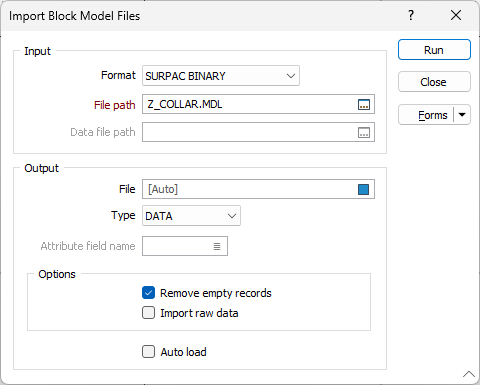Block Model
![]()
File path
In the Import Block Model form, double-click (or click on the Select icon) to select the name of the file you want to import. Once you have selected a file, you can right-click (F4) to view the file.
Format
Select a block model file format. The text file you have selected, must be in one of the following formats:
| Format | Description |
|---|---|
| DATAMINE BINARY | A binary block model file with a *.dm file extension. |
| DATAMINE TEXT | A text-based block model export file. The text file will usually have a .txt file extension. |
| SURPAC BINARY | A binary file with a .mdl file extension. |
| SURPAC TEXT | A text file with a (typically) .str or .obs file extension. |
| VULCAN | A binary block model file with a *.bmf file extension. Files with missing auxiliary schema are supported from version 25.0. |
| UBC | UBC (University of British Columbia) standard format - 2 text-based files that may have any file extension. |
| SURPAC FBM | A free format block model file with an *.fbm file extension. |
| OMF | An Open Mining Format project file (binary) with a *.omf file extension. |
File path / Data filepath
If you have selected UBC (University of British Columbia standard format) as the block model file format, the model is defined by two files.
The first file (specified by the File path) is a descriptive header file (known as a Mesh file) that specifies the number of rows, columns and branches, plus the origin and Voxel sizes.
The second file (specified by the Data filepath) is a data file that contains the property values associated with each of the Voxel cells defined in the Mesh file.
Output
File
Specify the file Type and enter (or double-click to select) the name of the output File.
If you don't enter a value, the name and location of the output file will be auto-filled. If the path created for Autofill has the same extension as the input file path, _MM is appended to the output file name.
Options
If you have selected the SURPAC BINARY block model file format, the following options are enabled:
Remove empty records
Select this option to remove those records containing blank attribute values.
Import raw data
By default, the Import process will regularise over-sized blocks (that Surpac may create by grouping empty blocks) and reduce them to the parent block size.
Select this option to override the default behaviour and import the raw data 'as is'.
Auto load
To display the data in Vizex once the file(s) have been imported, select the Auto load option.
Forms
Click the Forms button to select and open a saved form set, or if a form set has been loaded, save the current form set
Run
To begin the import process, click the Run button. If the specified output file already exists, you will be given the option of overwriting the file, or appending data to the file.
